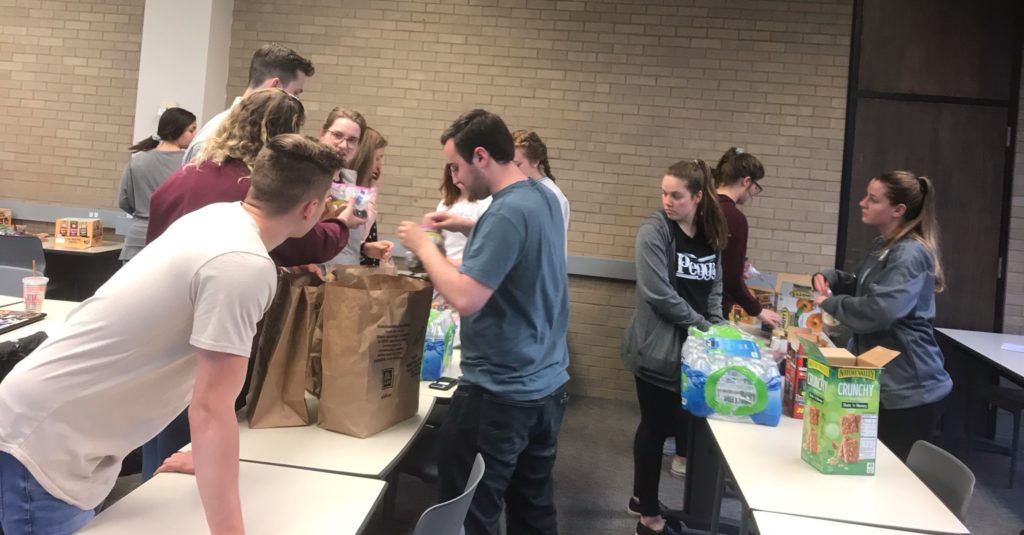By Amy Knudsen, Homelessness in America Professor

I utilize service learning in my Homelessness in America class to assist students in understanding this complicated and multi-layered problem. I connect community organizations that come and speak to the class on a variety of topics related to homelessness, have the class volunteer at a local shelter, and design and implement a class project that educates the Drake community on the issue.
Continual reflection was utilized by journaling, speaker reflection papers and reflecting on the group work and project. In addition, I asked students to reflect on what citizenship means, do they believe that volunteering is a necessary part of community and the role of the government in responding to the issue.
We had eight speakers from local organizations speak at the class and students volunteered at Central Iowa Shelter and Services. Students wrote thank you notes, sorted donations, checked in guests and handed out towels and hygiene items.
For the group project students wanted to educate the Drake community on homelessness as well as collect items for those living on the street or in camps. Students decided on hygiene and snack bags. With our service learning grant we were able to purchase 96 hygiene kits that contained soap, shampoo, toothpaste and toothbrush, razor and shave cream. They collected snack items for the snack packs by placing collection bins around campus and creating a venmo account for cash donations. To get the word out students reached out to organizations on campus, hung posters, created a Facebook event and tabled in Olmstead on April 16 and 17th. While tabling they had students answer questions on homelessness in Iowa and Polk County for candy prizes, collected notes of encouragement to put in the kits, gave tips on engaging with the homeless and panhandlers and distributed homeless services resource cards for Polk County.
The students collected items and raised an additional $200 that was used to purchase snack items. They assembled over 100 snack bags containing granola bars, beef stick, nuts, applesauce, a bottle of water, mints, a note of encouragement and a homeless service resource card. Over 200 snack and hygiene kits were delivered by students on May 8th to Primary Health Care’s Homeless Outreach Services.
The success of the class was seen in the student’s reflections:
“Through this project, and in particular through this class, I’ve learned a great deal about social inequality and homelessness. Most importantly I learned how bad the situation is for homeless individuals in Iowa and in Des Moines in particular. Sometimes it’s hard for people to recognize what’s going on in their own backyard, but I feel as if this class has opened my eyes to the reality of the homeless population in Iowa. “
“Specifically, regarding our project, it made me think about how often I take things for granted. A plastic bag with crackers, a water bottle, jerky, a granola bar, and a mint seem insignificant in my own life. That is a snack I would probably get between games at one of my old soccer tournaments for a travel soccer club that probably cost like $10,000 a year. Even then, I would probably only have the granola bar and the water and then throw the rest of the stuff out. These days, I do my best to salvage things that can be salvaged, but throughout this experience I have felt that there are things that I do still take things for granted, and I now feel confident that I can recognize and try to change that. Besides that, I have come to appreciate the services that the organizations we learned about offer. Not only do they clothe and feed people experiencing homelessness, but they try to provide things that every human should have available to them (medical assistance, federal aid, transitional housing, etc.).”
“I came in with a small amount of prior knowledge about this topic. I knew about the struggle for affordable housing, the growing rates of gentrification, and issues regarding the wealth gap, and that’s about it. Something that has stuck with me about this course is how difficult it is to rise out of poverty/homelessness and stay there. I also learned how frequently people get evicted, and how many regulations are at fault for these evictions. For example, in Evicted, we read that, in some places, if a tenant calls 911 three times or more in one month, they can be evicted. I was like…WHAT?!?!?!? There are so many injustices that few people are aware of and few people care about. Also, people experiencing homelessness can get in trouble with law enforcement basically by just existing. Why? Simply because better – off people don’t want to “see it”.”